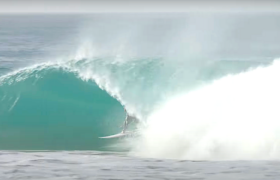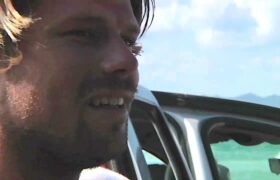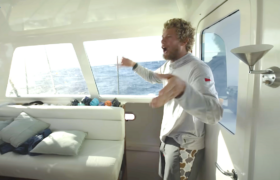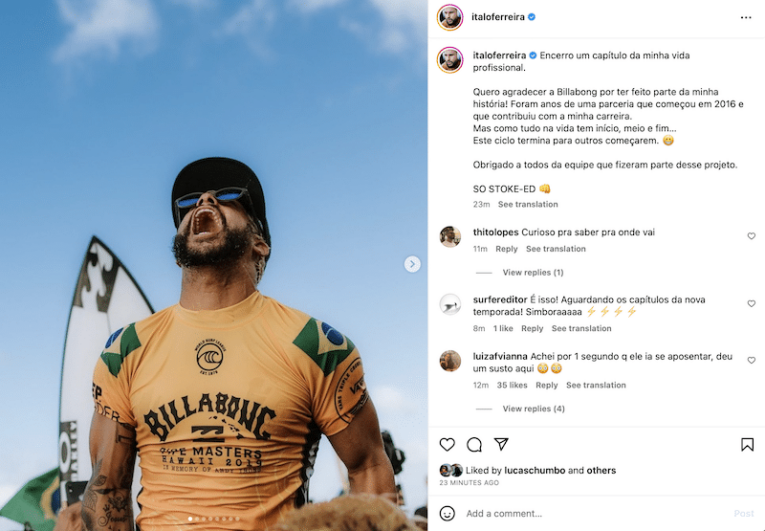“VW Golfs, Ford Escorts, neon fashion, sportswear and fast food. It’s a vibe!”
The African surf brand Mami Wata has come under fire for the supposed insensitivity of its latest clothing range which is inspired by eighties surf culture in Cape Town, back when the damn Afrikaners called the shots and before international and internal pressure crushed the wretched Apartheid regime.
Per Mami Wata,
“The combination of the turbulent dying days of the apartheid regime in South Africa, Africa’s increasing exposure to global culture and brands, 80’s surf culture and a surf break in False Bay enjoyed by a predominantly Black surf crew, influenced amongst other things by VW Golfs, Ford Escorts, neon fashion, sportswear and fast food. It’s a vibe!”
Artwork is by the absurdly talented Peet Pienaar, also a co-founder alongside Nick Dutton and Andy Davis. All men are of a white-ish hue, which is neither here nor there I think, but it’ll become important later.
It’s a nine-piece collection of t-shirts, sweatshirts, a short-sleeve button up, a couple of hoodies and a pair of trunks, although it ain’t cheap – tees seventy bucks, hoodies one-forty and trunks one twenty.
Again, I’ll spend four hundred on a pair of trunks if I think’ll serve my aesthetics for a couple of summers so the price don’t matter to me but, again, important in a second.
The Instagram account @surftherberg published an open letter to Mami Wata on October 5, giving ‘em hell for the range which dances, they say, on the trauma of apartheid-era surfers.
Dear Mami Wata,
Mami Wata presents itself as an African-centric surf and culture brand. Through this platform, you aim to convey African stories, utilise African iconography, and incorporate African nuances into your apparel, all while claiming to “deliver considerable economic, social and environmental value to local communities.”
However, in your most recent campaign titled “9 Miles” you have exploited a community of people who never sought representation by Mami Wata. They were neither consulted on your uninformed portrayal of them nor did they grand you permission to misrepresent their struggles and trauma for the benefit of a select few individuals with no real connection to the people you are profiting from.
The story of 9 Miles and the individuals who view this space as a refuge, a safe haven, and a place for healing have not given Mami Wata permission to misrepresent them,. They have not authorised the appropriation and profitization (sic) of their culture, their people, and their waves by Mami Wata.
To highlight a few discrepancies:
On your various platforms, you specifically reference the 1980s, a time when South Africa was under the rule of the Apartheid Government. During this period, people of color were forcibly removed from beaches, often with deadly consequences. They were denied the ability to swim, surf, and express themselves. Is it appropriate to turn this painful history into a t-shirt?
On your various platforms, you acknowledge this era as the “turbulent dying days.” This suggests that you are actively trying to monetise a pain and struggle to which you have no personal connection.
On your various platforms, you mentioned that a “predominantly black surf crew enjoyed this surf break.” Where did this perception come from? Who informed you that this “crew” consisted of a particular ethnic group? Who told you they enjoyed surfing there? Did this “crew” have a choice in where and how they enjoyed themselves? Furthermore, you reference their dietary choices of fast food as inspiration for your apparel range.
The story of 9 Miles and its surroundings should not be exploited by individuals who lack the right to do so. The residents of this place strongly oppose the use of its imagery, storytelling, and cultural references.
For those unaware, it’s important to note that Mami Wata is owned and operated by three South Africans, whose brand is built upon a culture that was nearly eradicated on the African continent. Visit the Mami Wata website and see for yourself if these three men should be representing Africa.
Lastly, the apparel ad merchandise are marketed as African yet they are priced at a level that many true Africans cannot afford. Go figure.
A comprehensive letter of complaint, no?
Comments were divided on the matter.
Against Mami Wata:
“I value your realness and well articulated points. As a Nine Miles local for most of my life, we have hopes and dreams to make Nine Miles accessible for all people to enjoy the break and the beach, and also turning it into a self sustainable area. It would’ve been cool if this brand came and sat down with locals, created a synergy where both parties win, but in this story, only one party wins! I feel yet again we as a people and our story, which these guys have no clue of what Nine Miles is about, are just out there to financially capitalize. Why Nine Miles? The place we were allowed to use as our place to swim and surf during the apartheid era. Our story is definitely not for these guys to be told!!!”
For Mami Wata:
“You’re opinion matter. I’m really sad you guys feel this way and sorry if you feel exploited and would like to understand that better, seriously.
“I think what mama watu does is above and beyond most brands. Do you know they donate 100% of there book proceeds to surfers not street children? They operate more like a charity then an actual brand, it’s actually insane in my opinion, sorry if that is opposing of yours. I can name 100’s of non profits where there founders get paid more then all of mama watus founders and employees combined! I’ve looked at the numbers and asked. Have you ever asked them if they are actually profitable?! How would you make them affordable? What brands do you support then?
“Is this feeling about all adversities ‘turned into profit’? Does Nike and hundreds of other companies putting #blacklivesmatter on their appearel bother you? Do books on apartheid not ‘make a profit’ off what happened? Hollywood Movies of wars and genocides!? Would you prefer if people ignored the past and never spoke of it? How would you like brands to operate, be reasonable cause entrepreneurship is so hard.
“Can you appreciate that someone stepped up and made a African surf brand period? So you don’t want them to exist and would rather support a billabong or ripcurl or anything else made in China?
If everyone had the time, money and resources to consult everyone agreed this world would be all peaches and cream, but I think everyone’s doing their best these guys especially ! Let’s celebrate the positives and spread that. Happy days and more waves!”
Both sides are terrifically persuasive, although I think the underlying issue here is the cost of the gear and the lack of an indigenous African among the founders, ie too many whites.
Selema Masekela joined the brand in 2018 as a “co-founder” along with various investors (two million bucks was raised by crowdfunding in 2020) but by 2022 had “stepped back from his roles and responsibilities as co-founder, but remains a shareholder and creative collaborator. “






